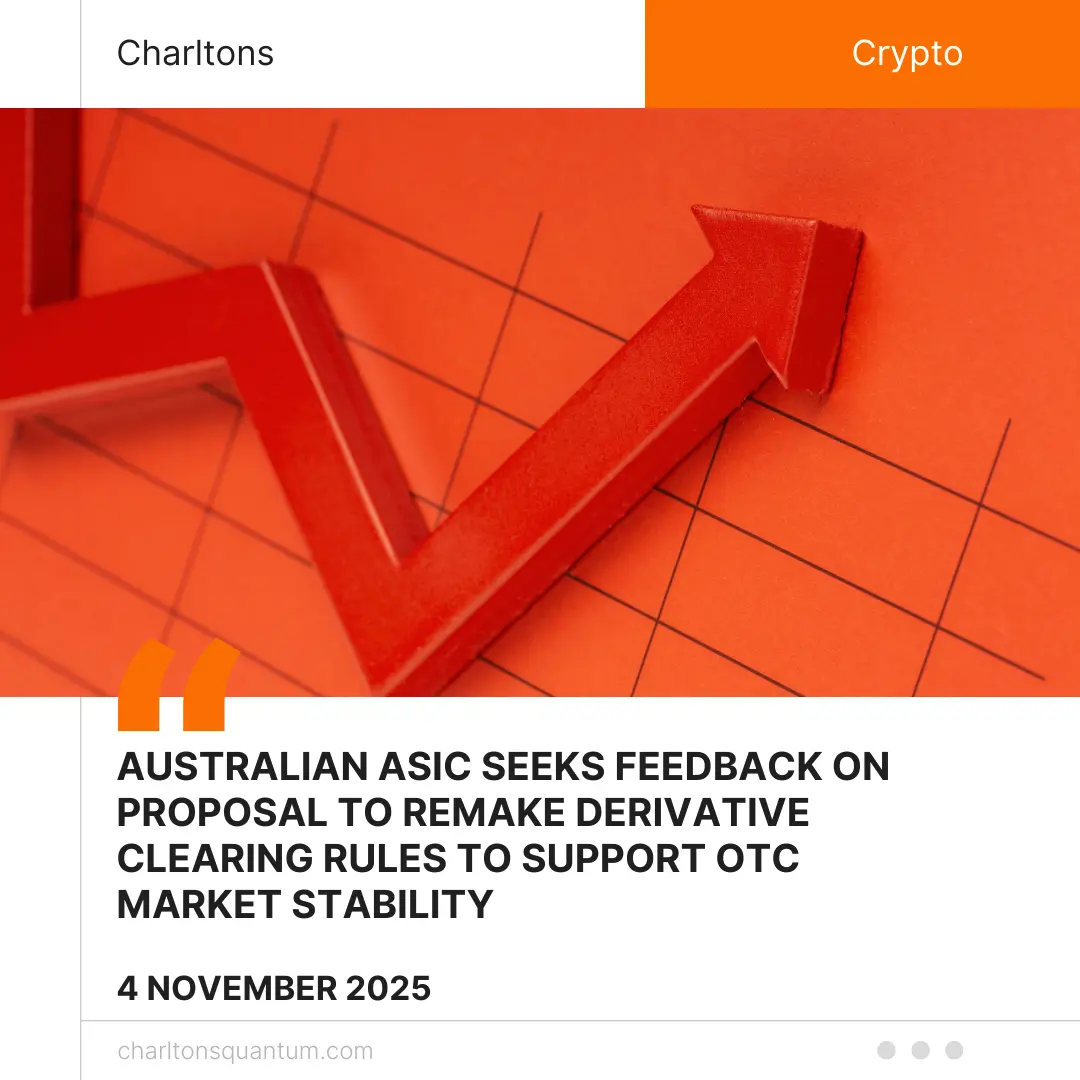
Kraken Operator Ordered to Pay AUD 8 Million for Regulatory Breaches Following ASIC Action
On 12 December 2024, the Australian Federal Court, in its judgment Australian Securities and Investments Commission v Bit Trade Pty Ltd 2024 FCA 1422, ordered Bit Trade Pty Ltd, the Australian operator of the Kraken cryptocurrency exchange, to pay AUD 8 million in penalties. The decision followed legal proceedings initiated by the Australian Securities and Investments Commission (ASIC), which found Bit Trade unlawfully issued a margin trading product to over 1,100 retail clients without meeting critical regulatory obligations under the Australian Corporations Act 2001 (Cth).
- ASIC alleged non-compliance with design and distribution obligations (DDO); Bit Trade failed to prepare a Target Market Determination (TMD) for its margin extension product, a mandatory document ensuring financial products are marketed to suitable consumers.
- The product allowed clients to borrow funds in national currencies like USD or digital assets such as Bitcoin to trade on the Kraken exchange, exposing them to heightened financial risks.
- Over 1,100 retail clients accessed the product between October 2021 and August 2023, incurring trading losses of approximately USD 5.25 million (AUD 8.2 million). Bit Trade earned USD 7.7 million (AUD 12 million) in fees and interest during this period.
- The Court found Bit Trade’s compliance systems were severely lacking, with reliance on flawed legal advice about the DDO regime. ASIC began its investigation into the margin trading product in March 2022.
- Justice Nicholas criticised Bit Trade’s failure to prioritise regulatory compliance, describing its approach as a deliberate attempt to prioritise revenue. The Court found breaches of Sections 994B(2) and Part 7.8A of the Corporations Act 2001.
- Bit Trade is ordered to pay AUD 8 million, higher than its proposed AUD 4 million but below the AUD 20 million sought by ASIC. The penalty is meant to deter similar breaches and is proportionate to the seriousness of the violations.
- The Court also directed Bit Trade to cover ASIC’s legal costs, noting that the failure to prepare a TMD deprived retail clients of necessary safeguards.
To read this news in detail click here
US SEC Orders Cantor Fitzgerald to Pay $6.75 Million for Misleading SPAC Disclosures
On 12 December 2024, the United States Securities and Exchange Commission (US SEC) issued a cease and desist order against Cantor Fitzgerald, L.P., a global financial services firm, for causing materially misleading disclosures by two special purpose acquisition companies (SPACs) under its control. The US SEC found that Cantor Fitzgerald misled investors regarding discussions with potential merger targets before the SPACs’ initial public offerings (IPOs). As part of a settlement, Cantor Fitzgerald agreed to pay a $6.75 million civil penalty.
- Cantor Fitzgerald was charged with causing two SPACs, CF Finance Acquisition Corp. II (CFAC II) and CF Acquisition Corp. V (CFAC V), to make false claims in IPO filings that they had no substantive discussions with potential merger targets.
- Investigations revealed pre-IPO negotiations with View, Inc. and Satellogic Inc., the eventual merger partners of CFAC II and CFAC V, respectively.
- Misleading disclosures were made in public filings, including Form S-1 registrations, final prospectuses, and proxy statements, obscuring Cantor’s pre-IPO merger discussions.
- Cantor Fitzgerald, headquartered in New York, has been actively involved in SPAC sponsorship, launching nine SPACs since 2018 and controlling their activities, from target identification to filing disclosures.
- CFAC II raised $500 million in its August 2020 IPO and later merged with View, Inc. in March 2021, following undisclosed pre-IPO talks involving diligence exchanges and meetings.
- CFAC V raised $250 million in its January 2021 IPO and merged with Satellogic Inc. in January 2022, despite pre-IPO negotiations including financial presentations and draft letters of intent.
- The US SEC determined Cantor caused CFAC II and CFAC V to violate Sections 17(a)(2) and 17(a)(3) of the US Securities Act of 1933, as well as Section 14(a) and Rule 14a-3 of the US Securities Exchange Act of 1934, which mandate truthful disclosures.
- Without admitting or denying the findings, Cantor Fitzgerald agreed to cease further violations and pay a $6.75 million penalty, which may be distributed to affected investors via a Fair Fund.
- The investigation was conducted by US SEC officials Eugene Bull, Rebecca Schendel Norris, and Gargi Chaudhuri, under the supervision of Laura B. Josephs.
To read this news in detail click here
US SEC Announces Leadership Change as Erik Gerding Steps Down, Cicely LaMothe to Serve as Acting Director
On 13 December 2024, the United States Securities and Exchange Commission (US SEC) announced that Erik Gerding, Director of the Division of Corporation Finance, will step down from his position effective 31 December 2024. Cicely LaMothe, the current Deputy Director of Disclosure Operations, will assume the role of Acting Director upon Mr Gerding’s departure.
- Erik Gerding joined the US SEC in October 2021 as Deputy Director of the Division of Corporation Finance, focusing on Legal and Regulatory Policy, and was appointed Director in February 2023.
- Before joining the US SEC, Mr Gerding was a Professor of Law at the University of Colorado and practised corporate and securities law at an international law firm. He holds a J.D. from Harvard Law School and an undergraduate degree from Duke University.
- Cicely LaMothe, who will serve as Acting Director, has held senior roles within the US SEC, including Associate Director of Disclosure Operations and Program Director of the Disclosure Review Program.
- She has been recognised for her contributions to diversity and inclusion, receiving the Chairman’s Award for Excellence in 2020 for her work with the US SEC Diversity Council.
- A Certified Public Accountant, Ms LaMothe holds a bachelor’s degree in accounting from Hampton University and has private sector experience as a financial reporting manager and senior associate at a national accounting firm.
- US SEC Chair Gary Gensler praised Mr Gerding for his leadership and acknowledged Ms LaMothe’s longstanding contributions and leadership.
To read this news in detail click here
US SEC Publishes Mandatory Electronic Filing and Website Disclosures for Financial Forms and Reports and Updates to FOCUS Reports
On 16 December 2024, the United States Securities and Exchange Commission (US SEC) published final rules requiring the electronic submission of certain materials under the United States Securities Exchange Act of 1934. The amendments mandate the use of the EDGAR system for filing and introduce structured data formats to streamline the process. The rules apply to market participants, including self-regulatory organisations (SROs), broker-dealers, security-based swap dealers (SBSDs), and registered clearing agencies. The final rules are still to be published in the federal register.
- The amendments target forms and materials currently submitted manually or through outdated formats, requiring electronic filing and public website postings where applicable.
- SROs must now electronically file forms like Form 1, Form 1-N, Form 15A, and Form CA-1 via EDGAR and post information on derivative securities products on their websites within two business days.
- Broker-dealers and non-bank SBS entities will electronically file annual audited reports, compliance reports, and notices such as Form 17-H via EDGAR.
- Registered clearing agencies must post supplementary materials online, ensuring transparency and accessibility.
- The Financial and Operational Combined Uniform Single (FOCUS) Report has been updated with clarifications, harmonisation, and technical corrections to streamline reporting for broker-dealers and OTC derivatives dealers.
- The amendments eliminate manual signature requirements for SRO filings and mandate structured data filings, phased in through 2028.
- Public comments submitted between March and May 2023 were incorporated into the final rules, ensuring stakeholder input shaped the amendments.
- Compliance dates vary:
- Broker-dealers and SBS entities must electronically submit annual audits and Form 17-H starting 30 June 2025.
- SROs must post Rule 19b-4(e) filings by 1 September 2025, with updates to other forms phased in from March to July 2026.
- Structured data requirements for large firms will begin in 2026, with full implementation by 2028.
To read this news in detail click here
UK FCA Publishes Discussion Paper DP24/4 Seeking Feedback on Strengthening Transparency and Market Integrity in Crypto Markets
On 16 December 2024, the United Kingdom Financial Conduct Authority (UK FCA) released Discussion Paper DP24/4, inviting feedback on proposals to enhance transparency, market integrity, and consumer protection in the UK’s crypto markets. The rules, if implemented, would apply to cryptoasset trading platforms, intermediaries, issuers, and other market participants targeting the UK.
- The discussion paper proposes introducing Admissions and Disclosures (A&D) requirements and a Market Abuse Regime for Cryptoassets (MARC) to reduce financial crime and protect consumers.
- The A&D regime mandates firms to produce comprehensive admission documents with details on risks, governance, and technical specifications of cryptoassets. Platforms must conduct due diligence on issuers to ensure compliance with disclosure standards.
- Platforms will be required to assess cryptoasset risks and reject those that pose significant consumer harm while publicly disclosing their admission and rejection standards.
- Admission documents will need to be filed on the UK FCA’s National Storage Mechanism (NSM) in a machine-readable format, such as XML or iXBRL, for improved accessibility.
- The MARC framework, modelled on the UK Market Abuse Regulation (UK MAR), will prohibit insider dealing, market manipulation, and unlawful disclosure of information to combat fraud and manipulative activities prevalent in unregulated crypto markets.
- For decentralised cryptoassets without identifiable issuers, such as Bitcoin, disclosure responsibilities will fall to the trading platform or entity seeking admission.
- Platforms are encouraged to share information on suspected market abuse across markets and implement robust monitoring systems to prevent misconduct.
- These proposals aim to regulate all major cryptoasset activities simultaneously, including trading, custody, and stablecoins, ensuring compliance with international standards set by IOSCO and the Financial Stability Board (FSB).
- The consultation period for DP24/4 closes on 14 March 2025, after which the UK FCA will review responses and proceed with detailed rule proposals.
To read this news in detail click here
UK FCA Publishes Consultation Paper on Private Stock Market PISCES to Transform UK Capital Access
On 17 December 2024, the United Kingdom Financial Conduct Authority (UK FCA) published Consultation Paper CP24/29 outlining plans for the Private Intermittent Securities and Capital Exchange System (PISCES). This proposed private stock market aims to provide a regulated platform for trading private company shares, addressing the growing demand for capital access as firms opt to remain private for longer.
- Designed to bridge the gap between private and public markets, offering diversified investment opportunities while addressing the risks of trading private company shares.
- Companies trading on PISCES must provide comprehensive disclosures, including financial details, governance structures, and material risks. Sustainability-related (ESG) disclosures will also be mandatory for firms claiming adherence to these principles.
- PISCES will operate through intermittent trading sessions, held quarterly or biannually, featuring aggregated order books for fair price discovery and measures to prevent excessive volatility.
- Only sophisticated or high-net-worth individuals meeting specific financial or expertise thresholds will be allowed to participate, with platform operators responsible for verifying investor eligibility.
- PISCES platform operators must obtain UK FCA authorisation, ensuring sufficient technological infrastructure, financial stability, and operational plans. Operators will monitor listed companies for disclosure compliance and implement real-time market surveillance systems.
- PISCES includes rules against insider trading, market manipulation, and unlawful disclosure of information. Trading platforms must maintain advanced surveillance tools and adhere to strict penalties for rule violations.
- PISCES will initially operate within a financial markets infrastructure sandbox, allowing firms and regulators to test and refine trading mechanisms under regulatory oversight.
- Platform operators must disclose all trading and listing fees, along with any additional administrative or operational charges.
- The UK Treasury plans to introduce the legal framework for PISCES by May 2025, with operational rules finalised by mid-2025. Full implementation is anticipated by late 2025, following a sandbox testing phase in the latter half of the year. Stakeholders are encouraged to participate in shaping the framework through the consultation process.
To read this news in detail click here
ASIC Sues Binance Australia Derivatives for Misclassifying Retail Clients and Consumer Protection Failures
On 18 December 2024, the Australian Securities and Investments Commission (ASIC) initiated civil proceedings in the Australian Federal Court against Oztures Trading Pty Ltd, trading as Binance Australia Derivatives, alleging breaches of consumer protection laws under the Australian Corporations Act 2001 (Cth). The case was filed in the Australian Federal Court’s Victoria Registry under File Number VID1381/2024. ASIC has initiated proceedings seeking civil penalties, declarations, and adverse publicity orders against Binance Australia Derivatives, the hearing date has not yet been scheduled.
- The case was filed in the Australian Federal Court’s Victoria Registry, with ASIC seeking civil penalties, declarations of legal breaches, and adverse publicity orders. A hearing date is yet to be scheduled.
- Binance Australia Derivatives operated under an Australian Financial Services (AFS) licence until April 2023, when ASIC cancelled the licence at Binance’s request following a regulatory review.
- ASIC alleges that between 7 July 2022 and 21 April 2023, Binance misclassified 83% of its client base as wholesale investors, excluding them from safeguards such as a Product Disclosure Statement (PDS), a Target Market Determination (TMD), and access to a compliant internal dispute resolution system.
- Binance’s internal compliance measures were deemed inadequate, with wholesale classifications approved in as little as five minutes, raising concerns over the firm’s due diligence.
- ASIC’s investigation revealed that Binance’s failures caused significant harm, with clients incurring AUD 13.1 million in trading losses during the misclassification period. Binance paid compensation for these losses in 2023.
- The alleged breaches include violations of the Australian Corporations Act 2001 (Cth), specifically, Section 1012B(3, Section 994B(1), Section 912A(1)(a), Section 912A(1)(b), Section 912A(1)(f), and Section 912A(1)(g)
- The court is expected to set directions and a hearing date in early 2025, as ASIC seeks to hold Binance accountable under Australian financial laws.
To read this news in detail click here
HK SFC Licenses Four Virtual Asset Trading Platforms Under Streamlined Licensing Process & Issues Circular
On 18 December 2024, the Hong Kong Securities and Futures Commission (HK SFC) announced the licensing of four virtual asset trading platforms (VATPs) under a streamlined licensing process. The platforms, Accumulus GBA Technology (Hongkong) Co. Limited, DFX Labs Company Limited, Hong Kong Digital Asset EX Limited, and Thousand Whales Technology (BVI) Limited, will operate under a restricted scope of business initially, as outlined in the HK SFC’s circular.
- The streamlined licensing process includes rectifying deficiencies identified during the HK SFC’s inspections and conducting independent vulnerability assessments and penetration tests to ensure compliance with security and operational standards.
- The multi-phase licensing framework focuses on robust regulatory compliance and operational security, safeguarding investor interests while fostering innovation in the virtual asset ecosystem.
- Newly licensed VATPs will initially operate under restricted business scopes until completing mandatory rectifications based on the HK SFC’s risk-based inspections conducted since June 2024.
- Independent third-party assessments are mandatory, covering systems like network devices, servers, firewalls, databases, and digital wallet infrastructure to address cybersecurity risks. Only platforms achieving satisfactory results in these assessments progress to the next phase.
- The second-phase assessment evaluates VATPs’ operational and compliance systems under a tripartite agreement with the HK SFC and external assessors. This phase requires certification of compliance with the SFC’s regulatory framework, including AML/CFT guidelines.
- Platforms granted unrestricted licences upon successful completion of the second-phase assessments can operate fully without limitations but must maintain ongoing compliance with SFC regulations.
- The framework applies to all VATPs, including those under transitional arrangements and new applicants, ensuring consistent regulatory oversight.
- A detailed roadmap for the licensing process and guidance on the second-phase assessments is available in the HK SFC’s circular, with updates for new applicants expected in early 2025.
- Unrestricted operations for existing licensees are projected to commence in mid-2025, contingent on meeting all regulatory requirements.
To read this news in detail click here





